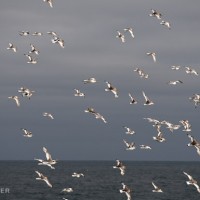
Keep It Going: Recycling in Phytoplankton Blooms
Dr. Adam Kustka has been wearing the same gray-and-black windbreaker for about two weeks. He doesn’t appear to sleep at all except for short naps, which consist of pulling his hood up and putting his head down on his desk in front of his computer monitor. His hands remain over the keyboard so that when […]
Read more

 February 11, 2011
February 11, 2011 




